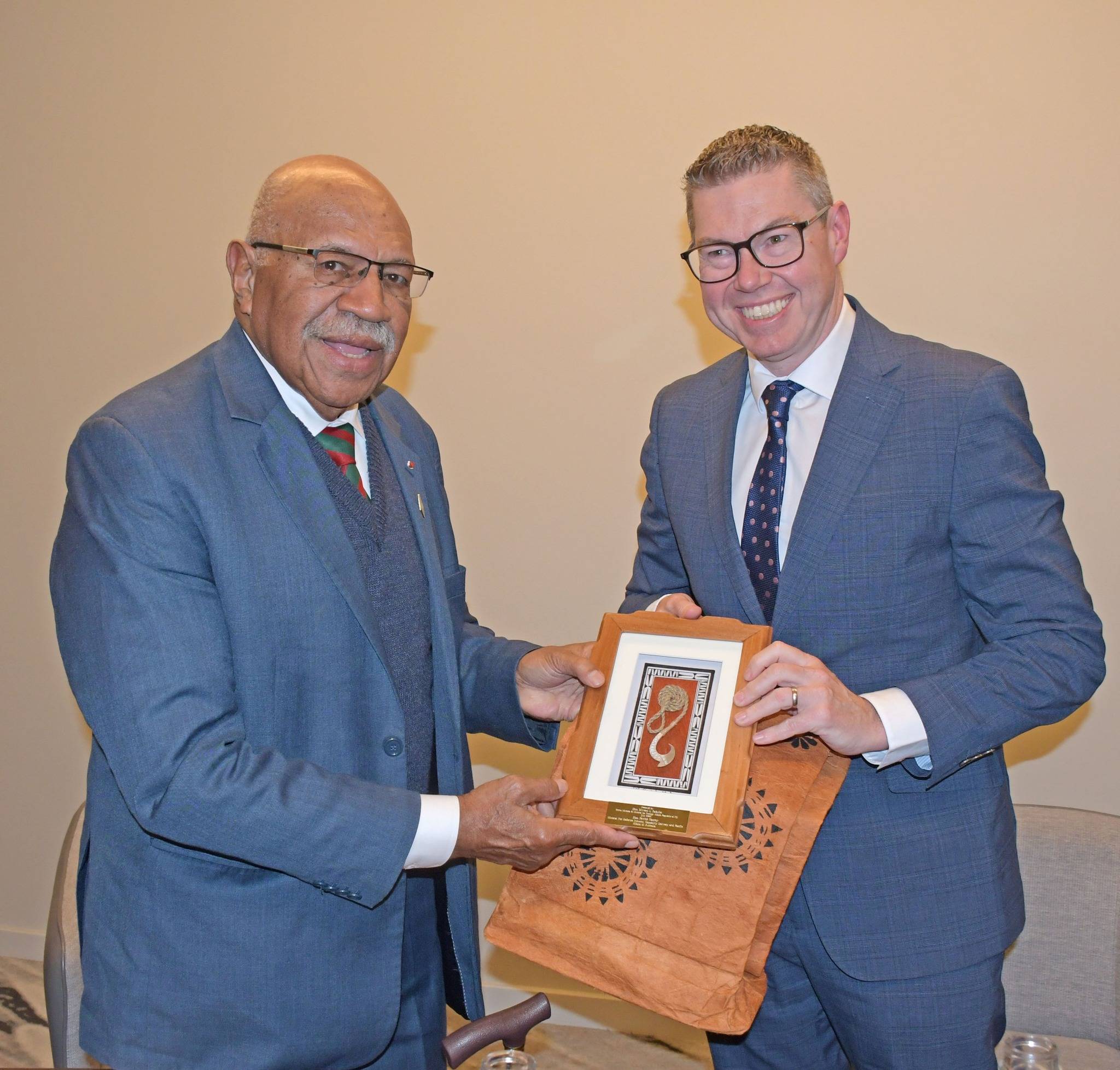|
Know what’s happening across Oceania—before your coffee’s cold.
OCEANIA MARKETS
|
S&P/ASX 200
|
8,630.30
|
+0.70%
|
|
|
S&P/NZX 50 Index Gross
|
12,689.63
|
+0.09%
|
|
|
SPX STRI Fiji
|
9258.01
|
0.00%
|
|
ASX 200 and NZX 50 Data Provided By:

|
|
*Market index data sourced from official exchange publications and financial data aggregators. ASX and NZX data reflect end-of-day figures from the Australian and New Zealand stock exchanges respectively. SPX (South Pacific Stock Exchange) figures reflect the most recent published data. Note: NZX and SPX figures include dividends (total return), while the ASX figure reflects share price movement only.
|
|
REGIONAL NEWS

Students and local leaders express deep concern as WITT faces uncertain future amid sector reforms. Photo Credit: RNZ / Robin Martin
Potential Closure of Western Institute of Technology at Taranaki Shocks Students and Community
|
The Western Institute of Technology at Taranaki (WITT), the region’s largest tertiary education provider, is facing potential closure or merger by mid-2026 unless it can demonstrate financial viability, following the New Zealand government’s unwinding of the centralized vocational education body, Te Pūkenga. This decision has stunned WITT students, who value the institute as an accessible alternative to university and an essential pathway to vocational careers. Students like Olivia Hansen and Zane Te Awhe have voiced how critical WITT is to their education and future employment prospects, expressing fears about losing this local option for practical training.
|
|
WITT is one of four polytechnics given a year to improve finances and operational sustainability, with recent efforts including restructuring and staff reductions aimed at cutting its deficit. Despite these efforts, community leaders like Taranaki Chamber of Commerce CEO Arun Chaudhari warn that closure would severely impact the region’s labor supply and economic vitality. The institute’s executive director, Olivia Hall, emphasizes ongoing consultations with staff and stakeholders to secure a viable future, acknowledging the difficulty but reaffirming commitment to maintaining WITT’s role in the community.
|
|
The government’s broader reform plan involves returning most polytechnics to regional governance by 2026 to better serve local needs, while WITT and a few others remain under Te Pūkenga’s transitional management pending viability decisions.
|

Grace Road representatives and Nauru government officials meet to discuss investment opportunities in agriculture and retail during a recent scoping mission. Photo credit: Nauru Media News - NTV
Grace Road’s Controversial Presence in the Pacific: Investment Amidst a Cloud of Allegations
|
A delegation from Grace Road, led by Mr. and Ms. Chae, undertook a two-day scoping mission to Nauru
from July 11–12, 2025, to explore prospective investment avenues in agriculture and retail. Facilitated by High Commissioner Aroi, the visit aimed to strengthen economic ties between Fiji-based enterprises and the Government of Nauru. Grace Road has gained both notoriety and praise in the Pacific as it seeks to expand its footprint, currently exploring new investment opportunities in Nauru’s agriculture and retail sectors. While the group is widely recognized for its high-quality supermarket and restaurant services—boasting consistently positive reviews for fresh, delicious Korean cuisine and welcoming hospitality in Fiji—their business ventures also come with significant controversy. Grace Road’s restaurants are celebrated for tasty dishes at affordable prices, attracting locals and tourists alike.
|
|
However, Grace Road’s reputation is clouded by allegations surrounding its founder, Pastor Shin Ok-ju, who has been convicted of fraud and abuse in South Korea. The controversial organization has faced criticism over coercive control practices, detainment of leadership figures—including Shin’s son in Fiji—and accusations of human rights abuses connected to their closed religious community. The Fijian government has taken legal actions related to immigration and unlawful detainment, reflecting the complex intersection between their expanding business empire and ongoing controversies.
|
|
This duality presents a challenge for Pacific island nations like Nauru, which welcome the economic benefits of Grace Road’s investments—such as job creation, improved food security, and quality retail experiences—while wrestling with the ethical questions posed by their religious affiliations and legal troubles.
|
PRESENTED BY VONU STUDIOS
Oceanian Animated Videos For Kids: Pawpaw Kids TV

|
Pawpaw Kids TV is a YouTube channel dedicated to engaging and educational content for children, with a specific focus on the Oceanian region. The channel features the Pawpaw Explorers—Illy the Iguana, Mo the Mongoose, and other animated characters—who embark on adventures that introduce young viewers to local wildlife, ocean currents, and cultural stories.
|
Pawpaw Kids TV offers a Pacific blend of entertainment and learning, making it a valuable resource for children to explore the rich cultures and natural wonders of the Oceania region. Simply scan the QR code to visit the Pawpaw Kids TV YouTube channel or click this link:
YouTube Link: Pawpaw Kids TV
|

Court finds no duty of care, leaving island communities to face a rising tide. The Torres Strait Island delegation received a smoking ceremony on their way into court. Photo credit: Baz Ruddick / ABC News
Torres Strait Islanders Lose Landmark Climate Case Against Australian Government
|
Australia’s Federal Court has handed down its decision in a high-profile climate justice case brought by two Torres Strait Islander traditional owners, Uncle Pabai Pabai and Uncle Paul Kabai. The plaintiffs argued the government owed a legal duty of care to protect their island homes from the worsening impacts of climate change, particularly sea level rise. Despite acknowledging that Torres Strait Islanders are facing severe and imminent threats and accepting the evidence of climate-driven damage, the court ruled that decisions about emissions targets and funding protective infrastructure fall under government policy—not the courts’ jurisdiction.
|
|
The outcome has devastated the plaintiffs and their communities. “My heart is broken for my family and my community,” said Uncle Pabai, reflecting on a case that’s lasted four years and highlighted how rising seas are eroding sacred burial sites and threatening traditional ways of life. Justice Michael Wigney cited the government’s “scant, if any, regard to the best available science” in earlier climate policies and warned of a “bleak future” for the Torres Strait without urgent action. Yet, he concluded that national climate policy decisions are not subject to judicial review or a legal duty of care.
|
|
This decision stands in stark contrast to a 2022 United Nations Human Rights Committee ruling
, which found that Australia violated the rights of Torres Strait Islanders by failing to protect them from climate impacts. The UN called for compensation and urgent action—outcomes still not realized under Australian law. The case shows the ongoing gap between scientific urgency, moral arguments, international obligations, and Australia’s domestic legal framework.
|

An Australian zoo’s hands-on meerkat experience ignites debate around animal welfare and ethical wildlife tourism. Photo credit: Central Coast Zoo
Bottle-Feeding Backlash: Aussie Zoo Faces Criticism Over $180 Meerkat Experience
|
A Central Coast zoo in New South Wales has come under scrutiny after promoting a $180 experience
where visitors can bottle-feed young meerkats. The widely-viewed video sparked both excitement and concern—while many expressed enthusiasm for the close encounter, wildlife advocates and professionals raised alarms about risks such as accidental drowning, excessive handling, and stress for the meerkats. The Department of Primary Industries, responsible for zoo compliance in NSW, has since stated they are working closely with the zoo to ensure all licensing and animal welfare regulations are upheld.
|
|
Zoo representatives clarified that the program was misunderstood, emphasizing that the meerkats involved were already weaned and primarily eating solid food. Guests are not forcefully feeding them; rather, the animals approach for supplemental bottle-nibbling on their own terms. The zoo asserts that welfare protocols align with the “Five Domains” framework, covering nutrition, health, environment, mental state, and behavioral interactions. Nonetheless, concerns from some keepers and veterinarians remain about the appropriateness of exposing any young, vulnerable animals to repeated public encounters, citing the animals' fragile immune systems and the potential stress of unfamiliar human interaction.
|

344% leasehold fee increase from $45,000 to $202,000 annually forces retiree into arrears and eviction proceedings. Photo credit: Jason Dorday / NZ Herald
Dilworth Trust Wins Court Battle to Evict Auckland Retiree Over Massive Ground Rent Hike
|
The Dilworth Trust has won a court case allowing it to evict an Auckland retiree from his Greenlane property after the man fell into arrears following a devastating 344% increase in annual ground rent fees. Annual leasehold payments for the residential property on Great South Rd, Greenlane, shot from $45,000/year to $202,000/year, making it impossible for the retiree to continue payments to the trust, which owns the land beneath his home. The case highlights the precarious nature of leasehold ownership in New Zealand, where property owners can face sudden, unaffordable rent increases despite owning the buildings on the land.
|
|
This eviction represents a growing pattern of leasehold disputes in Auckland, where dramatic ground rent increases have forced residents to abandon properties they thought they owned. Two men who spent years locked in court battles with the same landowner over leasehold homes they purchased in Auckland are warning others of the risks of the leasehold model, with some buyers discovering too late that what appeared to be affordable homeownership came with potentially ruinous ongoing costs. The leasehold system, while offering lower initial purchase prices, leaves homeowners vulnerable to ground rent increases that can make properties uninhabitable for middle-class families.
|
|
The Dilworth Trust case highlights the urgent need for leasehold reform in New Zealand, where some of the biggest issues for owners of leasehold flats and houses have been the spiralling cost of ground rent charged by the freeholder. While other jurisdictions are implementing reforms to protect leaseholders from excessive rent increases, New Zealand homeowners remain exposed to potentially devastating financial consequences. The retiree's plight serves as a stark warning about the hidden risks of leasehold ownership, where secure housing can become unaffordable overnight through no fault of the resident.
|
PRESENTED BY VONU STUDIOS
Children's Book: Vonu and the Druas Play Hide and Seek

|
Join Vonu the turtle and the stingray twins, the Druas Vai and Fai, in an exciting game of hide and seek! A heartwarming story filled with fun and adventure, perfect for young readers. Get your copy today!
|

Pacific Affairs Minister Pat Conroy meets with Fiji Prime Minister Sitiveni Rabuka to discuss the expanded Vuvale Partnership, which will see Australian Federal Police officers embedded within Fiji's police force as part of Australia's $500 million commitment to strengthen Pacific security cooperation. Photo Credit: Facebook/Fiji Government
Australia Embeds Police Officers in Fiji Force Under Expanded Vuvale Partnership
|
Australia has announced it will embed Australian Federal Police
officers within the Fiji Police Force as part of a significant expansion of the two nations' Vuvale Partnership. The AFP will embed strategic advisers within the FPF to assist across multiple capabilities including intelligence gathering, human resources and strategic operational planning. This new policing arrangement represents a major step in Australia's efforts to strengthen security cooperation across the Pacific region, replacing previous arrangements where Chinese police officers had been embedded with Fiji's force from 2012 to 2022.
|
|
The police embedding initiative is part of Australia's broader commitment to increase bilateral assistance to Fiji by $40 million over four years, taking the total to just under $500 million from 2025 to 2029. Australia is also providing $12 million to strengthen border security and will help implement Fiji's new National Security Strategy. The expanded partnership comes as Australia seeks to deepen its influence in the Pacific amid growing regional security concerns and competition from other powers.
|
|
The Vuvale Partnership, which takes its name from the Fijian word meaning "family" or "my home is your home," has evolved into one of Australia's most significant Pacific relationships. For Australia, the partnership serves multiple strategic interests: countering China's growing regional influence, maintaining its traditional sphere of influence in the Pacific, and leveraging Fiji's leadership role among Pacific island nations. The Fiji Government has also committed to hosting a previously announced Regional Centre of Excellence, further cementing the two nations' security cooperation. This police embedding arrangement signals Australia's commitment to supporting Pacific island nations' domestic security capabilities while advancing its broader Pacific Step-up strategy to ensure the region remains aligned with democratic values and Australian interests.
|
SPORTS
Guam's Deren Perez Hits Buzzer, Advances to American Ninja Warrior Semifinals

Coast Guard recruiter and "Guam Ninja" conquers obstacles to represent Guam on national television. Photo Credit: Trae Patton / NBC
|
Guam's Deren Perez, also known as the Guam Ninja, conquered the entire obstacle course and pressed the iconic buzzer on the most recent episode of American Ninja Warrior season 17, earning his spot in the semifinals. Chief Petty Officer Deren Perez slammed the buzzer, successfully completing Las Vegas's challenging obstacle course with a time of 2:45:65, earning a place in the top 10 finishers. The 40-year-old Coast Guard recruiter and 2002 Southern High School graduate had previously advanced to semifinals by "skating by" without hitting the buzzer, making this achievement particularly meaningful for the veteran competitor.
|
|
Perez credited his success to improved mental focus rather than physical ability, saying "I've always had the strength. I've always had the technique... The big difference was in my mental focus". After conquering the fifth obstacle, the V Formation, Perez knew he had secured "a win for Guam" – a goal he had pursued for nearly a decade. The experienced ninja athlete, who has also competed in Ninja Warrior UK, Sasuke Vietnam, and Philippines Ninja Warrior, applied the same mental strategies he teaches his students at his ninja athletics programs on the island.
|
|
For Perez, representing Guam on the national stage means more than pursuing the $250,000 grand prize, as he aims to prove "people from Guam have the mentality to achieve great things". The competitor, who is opening an indoor Ninja Warrior training facility at the old Håfa Adai Theater in Tamuning, will wave the Guam flag as he enters the semifinals stage. "As soon as I get up there, walking with that flag and I hear all the cheers and I hear people yell: 'Go, Guam,' like people who I have never met before... that is just so prideful. I feel so honored," Perez said.
|
REGIONAL EVENTS
-
Redcliffe KiteFest 2025
Celebrate community and the joy of flight at this iconic free festival in Moreton Bay!
|
Redcliffe KiteFest
returns to its roots this year with a vibrant celebration for all ages. Families and kite enthusiasts are invited to Pelican Park, Clontarf, to experience two full days of sky-high fun, delicious food trucks, and creative activities. Marvel at a spectacular display of giant kites, join in the public fly zone, and let the kids unleash their imagination at hands-on kite-making workshops. With plenty of open space for picnics and sky-watching, it’s a perfect way to welcome spring and the spirit of togetherness.
|
Event Details:
| Details |
Information |
| Dates |
Saturday 20 & Sunday 21 September 2025 |
| Time |
10:00 a.m. – 4:00 p.m. |
| Location |
Pelican Park, Hornibrook Esplanade, Clontarf, Redcliffe, QLD 4019 |
| Cost |
Free |
| Region |
Moreton Bay City |
| Contact |
(07) 3897 4999 |
|
|
No booking required—just bring your kite and your sense of wonder! For more information, visit the official Redcliffe KiteFest page.
|
-
U.S. Consular Services Visit Tahiti: Passport Renewals, Birth Registrations, and Notary Services
American citizens in French Polynesia can access key consular services in person this August.
|
From August 11 to 13, 2025, the U.S. Consulate
will hold a visit at the Yellow Fin Restaurant, Marina Taina, Punaauia, Tahiti, offering vital consular services including passport renewals, Consular Reports of Birth Abroad for children of U.S. citizens, and notary services for documents intended for use in the United States. Appointments are required and can be requested by emailing TahitiACS@state.gov by Friday, August 1, with limited walk-in availability depending on open slots. Travelers and residents are encouraged to plan ahead as regular passport processing may take 4 to 6 weeks, and birth registrations 5 to 7 weeks.
|
|
For more information or to schedule an appointment, contact the American Citizen Services directly via the provided email or phone number 49 99 19 99. Don’t miss this opportunity to complete essential documentation conveniently on the island.
|
QUICK TAKES
- Australia’s central bank, the Reserve Bank of Australia (RBA), has proposed banning surcharge fees on both debit and credit card payments starting July 2026—a move expected to save Australian consumers around $1.2 billion annually. The proposal targets surcharges on EFTPOS, Mastercard, and Visa transactions, which the RBA says no longer help consumers make efficient payment choices in a predominantly cashless society. Alongside banning surcharges, the RBA recommends lowering the cap on interchange fees paid by businesses to card issuers, which could save businesses an additional $1.2 billion, with smaller enterprises benefiting the most. The central bank highlighted that removing surcharges would simplify payments, increase transparency, and allow consumers to avoid switching between payment methods to dodge fees. The recommendations exceed previous government proposals by also including credit card surcharges, and they are currently open for public consultation before potential legislative action.
Was this email forwarded to you? Sign up here:
|
|
|
